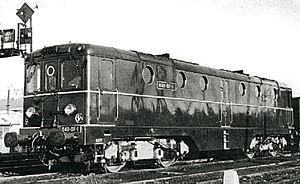SNCF 040.DF facts for kids
Quick facts for kids SNCF 040.DF.1SNCF BB 60041 |
|
 |
|
| SNCF 040.DF.1, later BB 60041 | |
| Power type | Diesel-hydraulic |
|---|---|
| Builder | Renault |
| Build date | 1952 |
| Total production | 1 |
| UIC classification | Bo′Bo′ |
| Gauge | 1,435 mm (4 ft 8 1⁄2 in) standard gauge |
| Wheelbase | 2.600 metres (8 ft 6+3⁄8 in), truck |
| Length | 15.000 m (49 ft 2+1⁄2 in) over Headstocks 15.960 m (52 ft 4+3⁄8 in) over Buffers |
| Width | 2.700 m (8 ft 10+1⁄4 in) |
| Height | 3.600 m (11 ft 9+3⁄4 in) |
| Axle load | 13.375 t (13.164 long tons; 14.743 short tons) |
| Locomotive weight | 53.500 t (52.655 long tons; 58.974 short tons) |
| Fuel type | Diesel |
| Prime mover | Renault 565, 2 off |
| Engine type | V12 Diesel |
| Cylinders | 12 |
| Nicknames | Birgitte |
| Withdrawn | 1970 |
| Disposition | Scrapped |
The SNCF 040.DF was a special kind of train engine, called a diesel-hydraulic locomotive. Only one of these was ever built! It was made in 1952 by a company called Renault for the SNCF, which is France's national railway company.
This locomotive was a "prototype," meaning it was a test model. Engineers wanted to see how well this new design would work.
Contents
What is a Diesel-Hydraulic Locomotive?
A diesel-hydraulic locomotive is a type of train engine that uses a diesel engine to create power. Instead of using electric motors to turn the wheels, it uses a special hydraulic system, similar to how some car transmissions work. This system helps transfer the engine's power to the wheels, making the train move.
The Life of 040.DF.1
When this unique locomotive was first built in 1952, it was given the number 040.DF.1. It was a single, experimental engine.
A New Name for the Train
In 1962, the SNCF decided to change how they named their trains. So, the 040.DF.1 got a new name: BB 60041. It was the same train, just with an updated number.
Its Special Look
The 040.DF.1, like another train called the 060.DA, had a very specific paint job. It was painted a dark green color with a bright yellow stripe running along its side. This paint scheme is called a "livery."
Why Was It Important?
Even though only one of these locomotives was made, it was important for testing new ideas in train technology. It helped engineers learn more about how diesel-hydraulic systems could work in real trains. This kind of testing helps make future trains better and more efficient.
The 040.DF.1 was used by the SNCF until 1970, when it was taken out of service and eventually scrapped.


